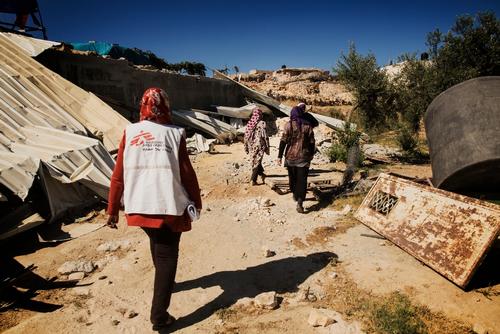Search operations conducted by the Israeli army in the West Bank following the kidnap of three young Israeli settlers has exacerbated the violence which some Palestinian families have to constantly cope with. Mélanie Kerloc’h is an MSF psychologist in Nablus from where she gives her account.
'I'm scared. I don't want them to come tonight even if I know it's just to scare us. I don't want them to arrest my father' a young Palestinian girl from the West Bank told Mélanie Kerloc’h, an MSF psychologist in Nablus. The occupied territories of the West Bank being used by the Israeli army as a full-scale training camp is just one of the many violent and traumatic situations facing some Palestinian families. 'The violence is constant. It is unrelenting and insidious,' explains Mélanie. 'It's a sword of Damocles which strikes sporadically,' and although not all Palestinians are uniformly exposed to the same degrees of violence, it has become chronic.
It is at night that families are most vulnerable, when sleep comes and they let their guard down. The sudden intrusion of soldiers into the house in the middle of the night, in the private family sphere which was supposed to be a refuge can, according to Mélanie, be experienced as a psychological break-in. 'Attacks by settlers on Palestinians and their homes are much more terrifying at night as they feel trapped. Violence also comes to take families in the heart of their private personal space.'
Children and teenagers are particularly at risk. 'The impact of these repeated break-ins on developing minds is very worrying', warns Mélanie. The parents of her young patients are often worried and overwhelmed. They cannot help their children to build the 'protective shield' necessary to mentally protect themselves and they feel powerless. 'Seeing your 14 year old son arbitrarily arrested without being able to object, it's harrowing and humiliating'. It robs them of their protective function. In the West Bank, a Palestinian child can be arrested and imprisoned from the age of 12 according to UNICEF.
From the disappearance of three young Israeli settlers to the discovery of their bodies, the Israeli army conducted large-scale search operations across the West Bank and arrested over 900 people according to the media. One week after having been subjected to an incursion in his house which was ransacked, a young 14 year-old boy was arrested, detained and beaten all night. According to Mélanie, 'this is how individuals are ground down by the violence of the system.' According to her patients, Israeli settlers or soldiers sometimes burst into Palestinian schools and speak to children as if they were enemies of their own size. 'Children who are subjected to this type of attack describe feeling both intense fear and intense mental excitement. They are overwhelmed by emotions that they are not yet able to control. How can they develop when they have to cope with that? Their mind is eaten away by violence,’ believes Mélanie.
Beyond the humiliations, words and threats that can be stated, even repeated like an onslaught, the accounts of the patients treated by MSF also raise the question of the way in which justice is done. 'Justice should be a means of settling cases which allows us to escape from the law of retaliation', says Mélanie. 'Yet here, justice is about an eye for an eye, a tooth for a tooth'. So when one of their sons was judged and imprisoned for a crime he had committed, one family was subjected to several army incursions in their home, when they were told 'in any case, you must also be punished for the crime committed by your son'. This collective punishment in addition to the legal ruling has a particularly destabilising effect particularly on sibilings and children, who are punished for an act they have not committed.
In such circumstances, it is practically impossible for young Palestinians to look to the future. 'Even if parents and children want to work hard at school or university, young people are living with no prospects, and the question of what the future holds is dizzying and terribly anxiety-provoking,’ concludes Mélanie.



